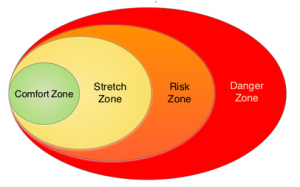There’s an interesting biological, survival instinct present in almost all animals, including humans: Stay inside your comfort zone.
As we progress through life, we accumulate knowledge and experience. These get incorporated into and define our comfort zone. Anything new is effectively outside of it, until we reach a certain level of familiarization, understanding and comfort. Then it’s in. This then is how we increase our comfort zone or to be more precise, how we grow.
Sometimes when we think of a new idea or possibility that is way outside of our base of experience, this mechanism kicks in and makes us resist – because it’s outside of our comfort zone. So we we dismiss it and look for an idea that is more comfortable. So instead of progressing and growing, we look for an easier idea that we feel more comfort with. If we keep doing this, we stifle our growth. In general, most things that we feel are too risky or challenging, we avoid and thereby are never attained.
Here it is on a bumper sticker: Everything you strive for is outside your comfort zone.
To achieve what you want means growing – gaining new knowledge and experience; sometimes fighting your natural instincts in order to get there.
Knowledge
On a macro scale, it’s our quest for knowledge and its application that has driven the advancement of every aspect of human development. On a micro level, it’s what drives the advancement of every individual. So, given that this is a key element of growth, how do we expand it?
- Start by finding out where the gaps in your knowledge are
- What strategies do you need to explore to fill these gaps effectively?
- How do you personally deal with the process of learning and applying new knowledge?
Get comfortable with the idea of gaining knowledge. The gap between wherever you are in life and where you want to be is primarily defined by your knowledge gap. The more knowledge you have about your particular area of interest, the more comfortable you will be dealing and engaging with it.
Experience
In the business world, when we talk about experience we are talking about having in-depth exposure to something. Preferably where we have had to deal or grapple with multiple aspects of a concept, process or operation. Mere exposure does not really qualify as experience. For example, most people have had exposure to mountain climbing say. The know the term and understand what’s involved more or less. To say they are experienced would not be true unless they had actually faced the challenges and the dangers involved.
In this case, it is not knowledge of mountain climbing that increases ones comfort zone but the experience of it.
Chances are this is an area of challenge.



The above blog is I feel on the money and the best way to expand your comfort zone. However, there is not always the option of expanding your comfort zone via a controlled growth format. As you say ‘Anything new is effectively outside ones comfort zone, until we reach a certain level of familiarization, understanding and comfort with it. Then it’s in’. Often in the Sales industry you are thrown into the deep end (danger zone) and there is a very limited period for controlled growth and with familiarizing yourself with what is comfortable. You could almost say it’s the complete opposite of comfortable trying to sell to a potential client you are meeting for the first time.
How do you suggest accommodating for these scenarios where you don’t have the chance to build your comfort zone through the stretch zone and risk zone but are likely to be faced with an on the spot encounter where you need to sell you product?
Interesting question Tim.
It comes down to, like so many things, the decisions and choices we make as individuals; and the nature of one’s risk profile.
If you are risk averse and in the sales industry, chances are you will choose an environemnt where the situation you outlined is unlikely to occur. Or put another way, as you start out on your sales career you begin in an easy environment and slowly increase your exposure as you become more comfortable. Your learning trajectory will be gradual and slow.
If you are not afraid of risk, you will plunge into a much more challenging environment that will push the limits of your comfort zone straight away. Your learning trajectory will be steep and fast. Thats something you would have to realize and accept before embarking on such a course, as many do.
That being the case, there would be a range of measure you could take to prepeare yourself. Good sales training would help a lot in preparing you for tough situation whilst in the safety of a training room. Public speaking would be another and there are perhaps a few other types of excersise one could do to provide similar emotional stress that needs to be overcome in these situations. In that way you would learn to cope and be better able to deal with the type of encounter you describe.